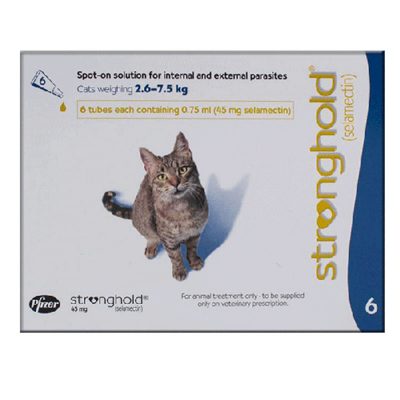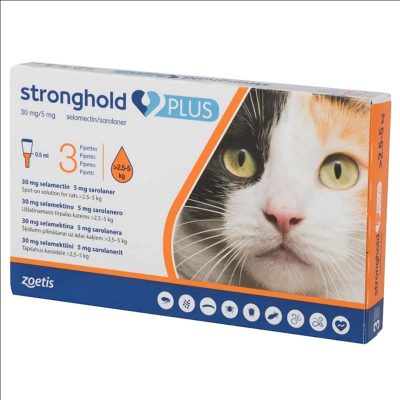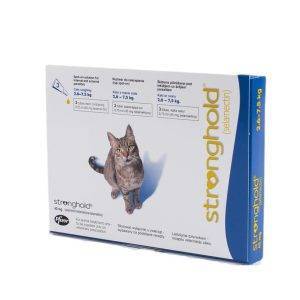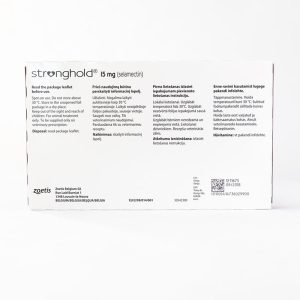Buy Stronghold For Cats Without Vet Prescription
Stronghold is a cat grooming product to treat fleas on their furs. Many cat owners use it since
Stronghold products are more reliable than other competitors.
Stronghold’s reliability lies in the ingredient it has. Selamectin is the primary ingredient in
every Stronghold product. It works well in eliminating fleas, ear mites, and various types of
worms, including heartworms, roundworms, and hookworms. Sometimes, cat lovers use the
ingredient in Stronghold to treat scabies, nasal mites, and cordylobiolosis.
How long can we expect Stronghold to kill the fleas?

Stronghold has more extended time in controlling fleas populations on cats when compared
to other brands with the same active ingredient. We can expect fleas and ticks to start dying
for around 4-8 hours after using the competitors’ brands. Nonetheless, it takes around 3
weeks for Stronghold users to get rid of the fleas.
It means Stronghold products are more natural than other competitors’ brands. Even though
other brands have much quicker times in killing the fleas and ticks, they are prone to cause
hypersalivation in cats when they accidentally consume it (or if we haven’t trained the cats to
not consume the medications orally).
Limits in using Stronghold products for cats
At the same time, there are limits to the use of Stronghold products for cats. One of the
limitations is that we can’t use Stronghold products for cats under eight weeks old. Another
limitation we can observe before using the product is that the cats should weigh at least 1.25
kg (or around 2.76 pounds).
According to good veterinary practice, cats (and every other animal) with more than 6
months of age should get heartworm infection tests before we can apply Stronghold products
for preventive purposes. It specifically applies to cats (and other animals, too) that live in
countries with vectors.
All Stronghold products are not suitable for debilitated cats. At some points, cat owners who
own cats with certain allergies or hypersensitivities to active ingredients should consult vets
(at least) for determining the doses and how to use the product in conjunction with other
grooming products.
Even though many cat lovers and vets use Stronghold to treat various worms, it is not
effective against D. immitis. Some other things we should remember about the Stronghold
products’ limitations are to never apply the product directly on the cats’ ear canals in case of
ear mite treatments and never apply it when the cats’ furs are wet.
Can we use Stronghold for cats without a vet prescription?
Yes! Stronghold for cats without vet prescription is highly possible in many countries.
Even though many cat lovers and vets recommend Stronghold products to treat various
diseases that we can’t treat by general medicines, we can buy the product at the nearest
supermarkets without bringing prescriptions from the vets.
More specifically, we can apply Stronghold if our cats are not debilitated in anyways.
Cats that don’t have allergies to active ingredients or certain ingredients in the product can
also be eligible for Stronghold.
There are some times when we already have the vet’s prescriptions on our hands. There are
also times when we have memberships or any forms of subscriptions to stores and
supermarkets that sell pet grooming products, including (but not limited to) Stronghold. Such
cases make it possible for us to apply Stronghold for cats without vet prescription.
How can we apply Stronghold for our cats (and how frequently should we do it)?
We should store Stronghold inside an environment under 30 degrees Celcius. It is always
better to store it inside a refrigerator to preserve the positive side effects it has for our cats. It
is also crucial to keep Stronghold products away from children before using them for our
cats.
We should apply Stronghold on our cats’ skin on the back of the neck. In addition, we can
also apply it by parting the cats’ fur first before directly pumping the pipette into the cats’
skin. Continue to pump until we empty the entire pipette.
We should also try our best not to let Stronghold touch areas where cats can lick them easily.
Hypersalivation can occur even though Stronghold is less harmful than other competitors
with the same active ingredient.
Normally, we need to apply Stronghold for cats every month. The starting month in applying
Stronghold would be the first month after the flea infestation. Such frequency is the same in
treating and preventing fleas on cats’ furs.
How do each Stronghold variations different from each other?

Here on our Anipetshop.com website, we sell two variations of Stronghold. The first variation we
sell is the Stronghold product you will normally see on offline and online stores. The second
variation is the improved formula of the already-existing Stronghold. We call the second
variation as Stronghold Plus.
Stronghold Plus contains selamectin and sarolaner. The latter ingredient enhances
selamectin’s effects in getting rid of fleas even before they lay eggs.
Since Stronghold only contains selamectin, the fleas can come back because the ingredient’s
primary function is to cause paralysis in the fleas (and the ticks). On the other hand, the
sarolaner in Stronghold Plus makes it more convenient for you to eliminate the fleas for good
since it causes hyperexcitation on fleas.
There are also four additional ticks that Stronghold Plus can handle, including the two Ixodes
ticks, Dermacentor reticulatus, and Rhipcephalus sanguineus.
The usual Stronghold itself can handle different types of worms. However, treating
gastrointestinal worms is not enough by using Stronghold. So, this is one of Stronghold Plus’
advantages. Furthermore, Stronghold Plus has more efficacies than the usual Stronghold
product.
Either way, we provide Stronghold and Stronghold Plus in our Anipetshop store as a solution to
remove the fleas on your cats’ furs. We also make it possible for you to apply Stronghold for
cats without vet prescription by shopping in our store.
>>Buy Stronghold Plus without vet prescription

Ryan Foley
Dr. Ryan's journey in the field of veterinary medicine began with his graduation from the University of Adelaide in 2014. Armed with a solid educational foundation, he embarked on a career dedicated to the well-being and care of animals.



